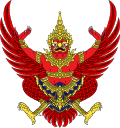| | First party | Second party | Third party |
|---|
| | | | | | Leader | Kukrit Pramoj | Pramarn Adireksarn | Bhichai Rattakul |
|---|
| Party | Social Action | Chart Thai | Democrat |
|---|
| Last election | 21.26%, 82 seats | 11.26%, 38 seats | 14.57%, 33 seats |
|---|
| Seats won | 92 | 73 | 56 |
|---|
| Seat change |  10 10 |  35 35 | 23  |
|---|
| Popular vote | 7,103,177 | 6,315,568 | 4,144,414 |
|---|
| Percentage | 26.78% | 23.81% | 15.63% |
|---|
| Swing |  5.52pp 5.52pp |  12.55pp 12.55pp |  1.06pp 1.06pp |
|---|
| | | Fourth party | Fifth party | Sixth party |
|---|
| | | SDP | | | Leader | Samak Sundaravej | Phon Rungprasitwit | Kriangsak Chamanan |
|---|
| Party | Thai Citizen | Siam Democrat | National Democrat |
|---|
| Last election | 2.69%, 32 seats | – | – |
|---|
| Seats won | 36 | 18 | 15 |
|---|
| Seat change |  4 4 | New | New |
|---|
| Popular vote | 2,395,795 | 839,915 | 2,137,780 |
|---|
| Percentage | 9.03% | 3.17% | 8.06% |
|---|
| Swing |  6.34pp 6.34pp | New | New |
|---|
|





